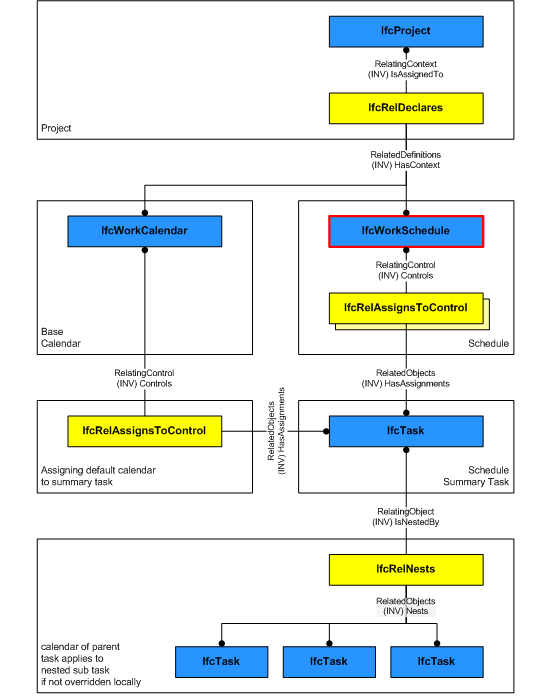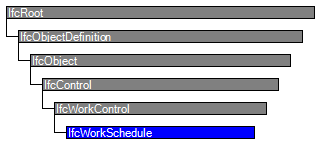Natural language names
 | Arbeitsprogramm |
 | Work Schedule |
 | Tache unitaire de travail |
 | Arbeitsprogramm |
 | Work Schedule |
 | Tache unitaire de travail |
| Item | SPF | XML | Change | Description | IFC2x3 to IFC4 |
|---|---|---|---|---|
| IfcWorkSchedule | ||||
| OwnerHistory | MODIFIED | Instantiation changed to OPTIONAL. | ||
| Identification | X | MODIFIED | Name changed from Identifier to Identification. Instantiation changed to OPTIONAL. | |
| CreationDate | X | X | MODIFIED | Type changed from IfcDateTimeSelect to IfcDateTime. |
| Duration | X | X | MODIFIED | Type changed from IfcTimeMeasure to IfcDuration. |
| TotalFloat | X | X | MODIFIED | Type changed from IfcTimeMeasure to IfcDuration. |
| StartTime | X | X | MODIFIED | Type changed from IfcDateTimeSelect to IfcDateTime. |
| FinishTime | X | X | MODIFIED | Type changed from IfcDateTimeSelect to IfcDateTime. |
| PredefinedType | MODIFIED | Name changed from WorkControlType to PredefinedType. Type changed from IfcWorkControlTypeEnum to IfcWorkScheduleTypeEnum. | ||
| UserDefinedControlType | X | DELETED |
An IfcWorkSchedule represents a task schedule of a work plan, which in turn can contain a set of schedules for different purposes.
HISTORY New entity in IFC2.0.
Declaration Use Definition
IfcWorkSchedule can reference a project (the single IfcProject instance) via IfcRelDeclares.
Figure 156 shows the backbone structure of a work schedule that defines (1) a context through IfcRelDeclares (not necessarily the project) and (2) controls tasks (typically the schedule summary task) and resources. Please note that a work calendar shall be assigned to the summary task and not the work schedule.
If an assigned IfcTask is a root-level task, such task must be declared on the IfcProject using the IfcRelDeclares relationship.
 |
Figure 156 — Work schedule relationships |
| # | Attribute | Type | Cardinality | Description | B |
|---|---|---|---|---|---|
| 14 | PredefinedType | IfcWorkScheduleTypeEnum | [0:1] | Identifies the predefined types of a work schedule from which the type required may be set. | X |
| Rule | Description |
|---|---|
| CorrectPredefinedType | The attribute ObjectType must be asserted when the value of the IfcWorkScheduleTypeEnum is set to USERDEFINED. |

| # | Attribute | Type | Cardinality | Description | B |
|---|---|---|---|---|---|
| IfcRoot | |||||
| 1 | GlobalId | IfcGloballyUniqueId | [1:1] | Assignment of a globally unique identifier within the entire software world. | X |
| 2 | OwnerHistory | IfcOwnerHistory | [0:1] |
Assignment of the information about the current ownership of that object, including owning actor, application, local identification and information captured about the recent changes of the object,
NOTE only the last modification in stored - either as addition, deletion or modification. | X |
| 3 | Name | IfcLabel | [0:1] | Optional name for use by the participating software systems or users. For some subtypes of IfcRoot the insertion of the Name attribute may be required. This would be enforced by a where rule. | X |
| 4 | Description | IfcText | [0:1] | Optional description, provided for exchanging informative comments. | X |
| IfcObjectDefinition | |||||
| HasAssignments | IfcRelAssigns @RelatedObjects | S[0:?] | Reference to the relationship objects, that assign (by an association relationship) other subtypes of IfcObject to this object instance. Examples are the association to products, processes, controls, resources or groups. | X | |
| Nests | IfcRelNests @RelatedObjects | S[0:1] | References to the decomposition relationship being a nesting. It determines that this object definition is a part within an ordered whole/part decomposition relationship. An object occurrence or type can only be part of a single decomposition (to allow hierarchical strutures only). | ||
| IsNestedBy | IfcRelNests @RelatingObject | S[0:?] | References to the decomposition relationship being a nesting. It determines that this object definition is the whole within an ordered whole/part decomposition relationship. An object or object type can be nested by several other objects (occurrences or types). | X | |
| HasContext | IfcRelDeclares @RelatedDefinitions | S[0:1] | References to the context providing context information such as project unit or representation context. It should only be asserted for the uppermost non-spatial object. | ||
| IsDecomposedBy | IfcRelAggregates @RelatingObject | S[0:?] | References to the decomposition relationship being an aggregation. It determines that this object definition is whole within an unordered whole/part decomposition relationship. An object definitions can be aggregated by several other objects (occurrences or parts). | X | |
| Decomposes | IfcRelAggregates @RelatedObjects | S[0:1] | References to the decomposition relationship being an aggregation. It determines that this object definition is a part within an unordered whole/part decomposition relationship. An object definitions can only be part of a single decomposition (to allow hierarchical strutures only). | X | |
| HasAssociations | IfcRelAssociates @RelatedObjects | S[0:?] | Reference to the relationship objects, that associates external references or other resource definitions to the object.. Examples are the association to library, documentation or classification. | X | |
| IfcObject | |||||
| 5 | ObjectType | - | This attribute is out of scope for this model view definition and shall not be set. | ||
| IsTypedBy | IfcRelDefinesByType @RelatedObjects | S[0:1] | Set of relationships to the object type that provides the type definitions for this object occurrence. The then associated IfcTypeObject, or its subtypes, contains the specific information (or type, or style), that is common to all instances of IfcObject, or its subtypes, referring to the same type. | X | |
| IsDefinedBy | IfcRelDefinesByProperties @RelatedObjects | S[0:?] | Set of relationships to property set definitions attached to this object. Those statically or dynamically defined properties contain alphanumeric information content that further defines the object. | X | |
| IfcControl | |||||
| 6 | Identification | - | This attribute is out of scope for this model view definition and shall not be set. | ||
| Controls | IfcRelAssignsToControl @RelatingControl | S[0:?] | Reference to the relationship that associates the control to the object(s) being controlled. | X | |
| IfcWorkControl | |||||
| 7 | CreationDate | IfcDateTime | [1:1] | The date that the plan is created. | X |
| 8 | Creators | - | This attribute is out of scope for this model view definition and shall not be set. | ||
| 9 | Purpose | - | This attribute is out of scope for this model view definition and shall not be set. | ||
| 10 | Duration | - | This attribute is out of scope for this model view definition and shall not be set. | ||
| 11 | TotalFloat | - | This attribute is out of scope for this model view definition and shall not be set. | ||
| 12 | StartTime | IfcDateTime | [1:1] | The start time of the schedule. | X |
| 13 | FinishTime | - | This attribute is out of scope for this model view definition and shall not be set. | ||
| IfcWorkSchedule | |||||
| 14 | PredefinedType | IfcWorkScheduleTypeEnum | [0:1] | Identifies the predefined types of a work schedule from which the type required may be set. | X |
Control Assignment
The Control Assignment concept applies to this entity as shown in Table 7.
| ||
Table 7 — IfcWorkSchedule Control Assignment |
| Exchange | ||||
|---|---|---|---|---|
| Import | O | |||
| Export | O |
| # | Concept | Model View |
|---|---|---|
| IfcRoot | ||
| Software Identity | Bridge View | |
| User Identity | Bridge View | |
| Object Ownership | Bridge View | |
| IfcObject | ||
| Property Sets for Objects | Bridge View | |
| IfcWorkSchedule | ||
| Control Assignment | Bridge View | |
<xs:element name="IfcWorkSchedule" type="ifc:IfcWorkSchedule" substitutionGroup="ifc:IfcWorkControl" nillable="true"/>
<xs:complexType name="IfcWorkSchedule">
<xs:complexContent>
<xs:extension base="ifc:IfcWorkControl">
<xs:attribute name="PredefinedType" type="ifc:IfcWorkScheduleTypeEnum" use="optional"/>
</xs:extension>
</xs:complexContent>
</xs:complexType>
ENTITY IfcWorkSchedule
SUBTYPE OF (IfcWorkControl);
PredefinedType : OPTIONAL IfcWorkScheduleTypeEnum;
WHERE
CorrectPredefinedType : NOT(EXISTS(PredefinedType)) OR (PredefinedType <> IfcWorkScheduleTypeEnum.USERDEFINED) OR
((PredefinedType = IfcWorkScheduleTypeEnum.USERDEFINED) AND EXISTS(SELF\IfcObject.ObjectType));
END_ENTITY;